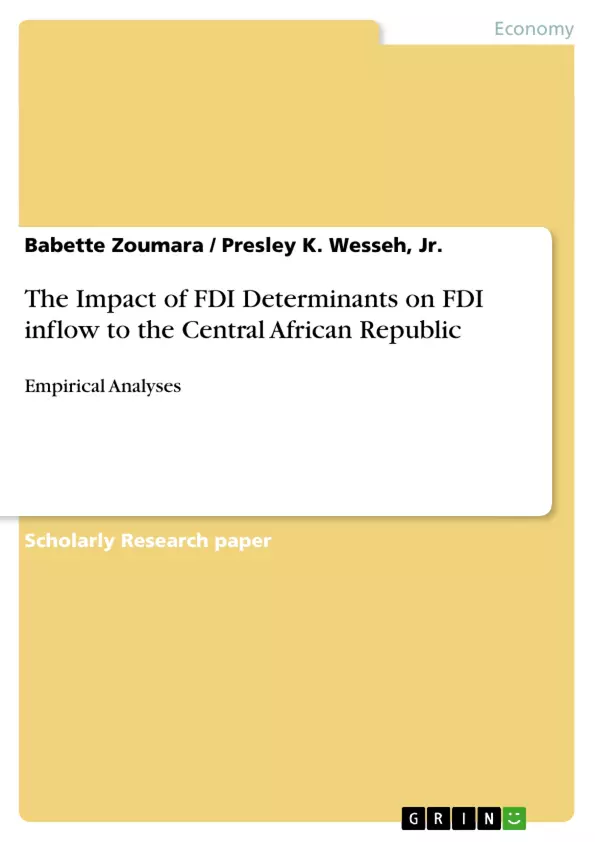With Autoregressive Distributed Lag (ARDL) bound test technique to cointegration and Error Correction Model (ECM), the impact of FDI determinants on FDI to the Central African Republic (CAR) from 1965 to 2010 was empirically examined. Results show that all regressors were of the order of one [I (1)] except inflation rate [I (0)], with stable cointegrating relationship with FDI. Additionally, diagnostic tests proved that the model was correctly specified and reliable; with FDI inflow statistically and positively correlating with market size, inflation and corruption but negatively with openness to trade and political instability. Political instability had strongest negative impact; implying that FDI responds to political instability in CAR more than the rest of the explanatory variables. Therefore, in order to attract the required FDI, the security situation in the country needs to be improved and efforts must be directed towards improving the economic performance of the country by diversifying its economic activities and encouraging private participation. Furthermore, CAR needs to secure its borders by cooperating with its neighbours on possible joint border patrols. For long term policy intervention, good governance and its attendant conditions (rule of law, transparency, accountability, respect for human rights and equal opportunities) and institutions (strong and independent judiciary, opposition, media, electoral commission, security force and public services) must be pursued. Most importantly, higher education must be prioritized and implemented to foster national unity, reduce crime and conflicts, and provide employment, better salaries, and vibrant domestic economic activities to generate revenue for rapid and sustained economic development.
Inhaltsverzeichnis (Table of Contents)
- Introduction
- The Central African Republic (CAR)
- Foreign Direct Investment (FDI)
- Determinants of FDI
- Determinants for CAR
- METHODOLGY
- The Model
- Data and Sources
- Econometric Technique
- RESULTS AND DISCUSSIONS
- Long-Run Estimates
- Short-Run Estimates
- Stability Tests
- Impulse Response Function (IRF)
- CONCLUSION AND POLICY RECOMMENDATIONS
Zielsetzung und Themenschwerpunkte (Objectives and Key Themes)
This research explores the impact of FDI determinants on FDI inflows to the Central African Republic (CAR) between 1965 and 2010. The study aims to understand how factors such as inflation, market size, corruption, openness to trade, and political instability influence FDI decisions in the CAR. The main objectives are:- To identify and analyze the key determinants of FDI inflow to the CAR.
- To investigate the relationship between these determinants and FDI inflow using econometric techniques.
- To assess the relative importance of these determinants and provide policy recommendations based on the empirical findings.
Zusammenfassung der Kapitel (Chapter Summaries)
Introduction
The chapter provides a comprehensive overview of the CAR's socio-economic landscape and challenges, highlighting the role of foreign direct investment (FDI) in driving economic growth and development. The chapter further discusses the diverse theoretical perspectives on the impact of FDI on economies and the various determinants that attract or discourage FDI, focusing on the specific case of the CAR.METHODOLGY
This chapter details the econometric model utilized to examine the impact of FDI determinants on FDI inflow to the CAR. It outlines the model's structure, the data sources, and the chosen econometric technique—Autoregressive Distributed Lag (ARDL) bound test to cointegration—used for the analysis.RESULTS AND DISCUSSIONS
This section presents the empirical findings from the econometric analysis, focusing on both the long-run and short-run relationships between FDI determinants and FDI inflow to the CAR. It includes an assessment of the model's stability, an analysis of impulse response functions, and a discussion of the relative impacts of different determinants on FDI.CONCLUSION AND POLICY RECOMMENDATIONS
This chapter summarizes the key findings and conclusions drawn from the empirical analysis. It presents policy recommendations based on the results of the research, suggesting strategies for attracting FDI to the CAR and fostering sustainable economic growth and development.Schlüsselwörter (Keywords)
The study examines the impact of FDI determinants on FDI inflow to the Central African Republic (CAR), focusing on the role of economic, political, and institutional factors. The main keywords and focus topics include: foreign direct investment (FDI), determinants of FDI, Central African Republic (CAR), Autoregressive Distributed Lag (ARDL), cointegration, econometrics, economic growth, political stability, institutional quality, policy recommendations, and economic development.Frequently Asked Questions
What are the key determinants of FDI in the Central African Republic?
The main determinants include market size, inflation, corruption, openness to trade, and political instability.
How does political instability affect FDI in the CAR?
Political instability has the strongest negative impact on FDI inflows, meaning investors are highly sensitive to the country's security and political situation.
What is the relationship between corruption and FDI in this study?
Interestingly, the empirical results showed a statistical positive correlation between corruption and FDI inflow in the specific context of the CAR during the studied period (1965-2010).
What policy recommendations are made to attract more investment?
Recommendations include improving national security, diversifying economic activities, ensuring good governance (transparency, rule of law), and prioritizing higher education.
What econometric technique was used for the analysis?
The study utilized the Autoregressive Distributed Lag (ARDL) bound test technique to examine cointegration and long-run relationships.
- Arbeit zitieren
- Babette Zoumara (Autor:in), Presley K. Wesseh, Jr. (Autor:in), 2012, The Impact of FDI Determinants on FDI inflow to the Central African Republic, München, GRIN Verlag, https://www.grin.com/document/269313



